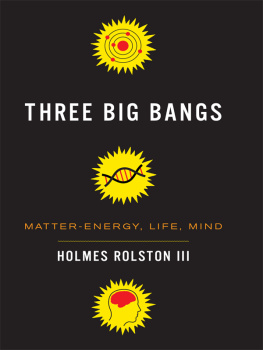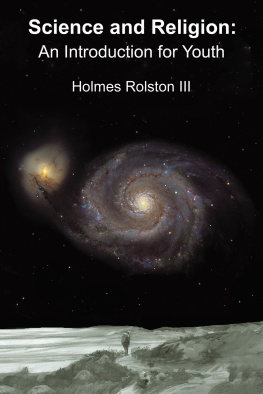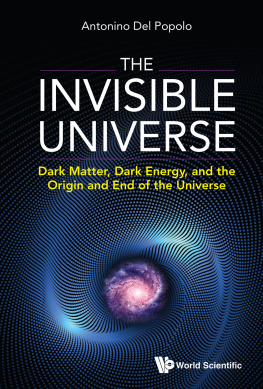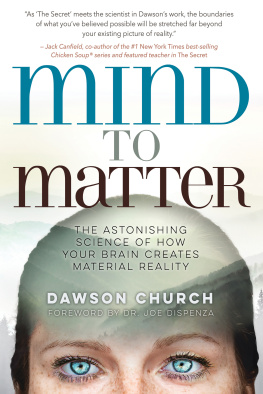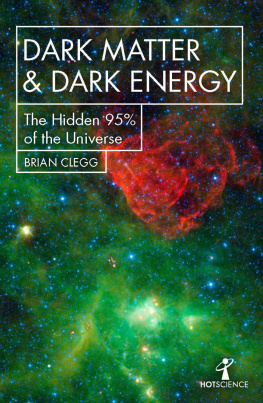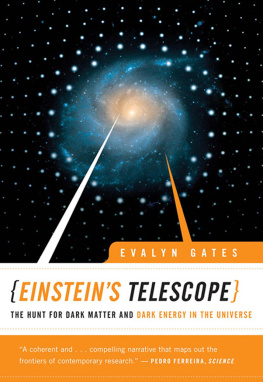THREE BIG BANGS
Three Big Bangs
Matter-Energy, Life, Mind
Holmes Rolston III
COLUMBIA UNIVERSITY PRESS NEW YORK

COLUMBIA UNIVERSITY PRESS
Publishers Since 1893
New York Chichester, West Sussex
cup.columbia.edu
Copyright 2010 Columbia University Press
All rights reserved
E-ISBN 978-0-231-52684-5
Library of Congress Cataloging-in-Publication Data
Rolston, Holmes, 1932-
Three big bangs : matter-energy, life, mind / Holmes Rolston III.
p. cm.
Includes bibliographical references (p.) and index.
ISBN 978-0-231-15639-4 (cloth : alk. paper) ISBN 978-0-231-52684-5 (electronic)
1. Evolution. I. Title.
B818.R65 2011
A Columbia University Press E-book.
CUP would be pleased to hear about your reading experience with this e-book at .
References to Internet Web sites (URLs) were accurate at the time of writing. Neither the author nor Columbia University Press is responsible for URLs that may have expired or changed since the manuscript was prepared.
CONTENTS
| . | Symmetry-breaking at the big bang explosion |
| . | Diversification of life through time for all organisms |
| . | Diversification of life through time for continental organisms |
| . | Diversification of life through time for marine organisms |
| . | Average number of plant species found in local floras |
| . | Species diversity changes in vascular plants |
| . | Changes in the composition of vertebrate orders and numbers of insect genera |
| . | Changes in plant species diversity in Silurian-Devonian times |
| . | Changes in plant species diversity in Carboniferous-Lower Cretaceous times |
| . | Changes in plant species diversity in Cretaceous-Tertiary times |
| . | Changes in species diversity in Silurian-Tertiary times |
| . | Diversity of fossil vertebrates |
| . | Evolutionary development by endosymbiosis |
| . | Increasing cranial capacity in the hominoid line |
Plato argued, famously, that we ought to carve nature at the joints (Phaedrus 265e). I plan to carve nature at the explosions. There have been three big bangs: generating matter-energy, generating life, generating the human mind. These explosions form no simple continuum but a complicated, diffracted, exponential story. Big bang is here a metaphor for critical, exponential, nonlinear bursts with radical consequences for exploring new state spaces with novel combinatorial possibilities. Using another term, there have been three big singularities.
En route we will have to use our big heads to avoid what I might call the rarification fallacy, the idea that what is rare is unimportant. Are the singularities signals revealing the nature of nature? Transcendent Presence in, with, and under nature? The three big bangs raise big questions, ultimate questions.
Seeking theories of everything is tolerated, even encouraged, within astrophysical cosmology, but if a metaphysician seeks a grand narrative, that is often discouraged as an impossible quest. The world is too big and too complex even to think about all in one go. The best we can do is philosophy piecemeal. Equally, anyone who seeks foundations is nowadays thought to be hopelessly archaic. My search here is archaic in a better sense, a search for the elemental, fundamental givens we encounter in nature. Finding these, what worldview can we build?
Socrates claimed: The unexamined life is not worth living (Apology 38). Know thyself. Yes, but: Life in an unexamined world is not worthy living either. Humans are the only species capable of realizing how grand is this world they inhabit, the astronomical universe, the panorama of life that vitalizes this planet, as well as of examining themselves and the minds with which they do so. One needs encounter with the nature of these three big bangsmatter-energy, life, mindto become a three-dimensional person. Foundations or not, one does need to be inclusive, comprehensive in ones worldview. Today, the examined life is not possible without examining the world in terms of these three big bangs.
Discovering the three big bangs has required the genius of millennia of human history; today we see further because we stand on the shoulders of giants (Newton). At the same time, the nature we have discovered with such collective genius is inescapably right there in your face in the great outdoors for anyone to see. A walk in a forest confronts you with life surrounding; the starry night sky is over your head. Facing life surrounding, facing the night sky, you realize mind behind your face: the facing mind.
We can take Albert Einstein as an icon of discovering the first big bang in the astronomical heavens (or at least of contemporary physics); we can take Charles Darwin as an icon of discovering the second big bang, evolutionary life on Earth. But then the third big bang inescapably confronts us. Continuing to take Einstein and Darwin as icons, the marvel is not just heavens above or earth beneath; the marvel is equally, indeed more so, the human minds capable of such knowledge.
This is a short book for searchers, students, and academics, and also for the general literate reader. In this search, I make full effort to put readers in contact with the original sources and authorities. We here try to look over their shoulders to see what those in the know know. Or, since at cutting edges the experts often still wonder, where they think the intellectual frontiers are. We humans today, in a new millennium, seem poised on the edge of yet another combinatorial information explosion, with escalating possibilities in science and technology, evidenced in the recent decoding (and possible transforming) of our own genome and in unprecedented information storing, sharing, and processing on the Internet. Wondering where we are, wondering who we are, we will be better able to wonder what we ought to do.
No one can know firsthand all the details of the materials we survey; that would require a mastermind in cosmology, microphysics, evolutionary history, paleontology, genetics, molecular biology, neuroscience, psychology, logic, ethics. Still, I write with the persuasion that good philosophers and theologians, good inquiring minds, can look over the shoulders of those who are doing these things and spot what is metaphysically interesting. In one sense, doing this, we are jacks of all trades, masters of none. In another sense, we are more inclusive, more comprehensive than the scientists.
Then again, whatever the philosophers may say with their epistemological doubts, the sciences do demand more accounting of these singular data points: matter, life, mind. The scientists have developed strategiestheories, instruments, critical methodsthat do approximate a real world. Astrophysics has discovered a vast universe, deep space and time; evolutionary biology has documented a vast fossil record. Whatever one thinks about the social construction of science, it is irrational to deny that such discoveries are of what is objectively there: galaxies and fossils; and that these record a long and eventful past that precedes us and makes our contemporary cognizing presence possible.
Both the first and the second big bangs resulted in us: the Homo that is so sapiens. A third has taken place within us, the minds big bang in the explosion of cultures with radical capacities for the generation and cumulative transmission of ideasknowledge, wisdom. Man is the measure of things, said Protagoras, another Greek philosopher (recalled in Plato,
Next page
